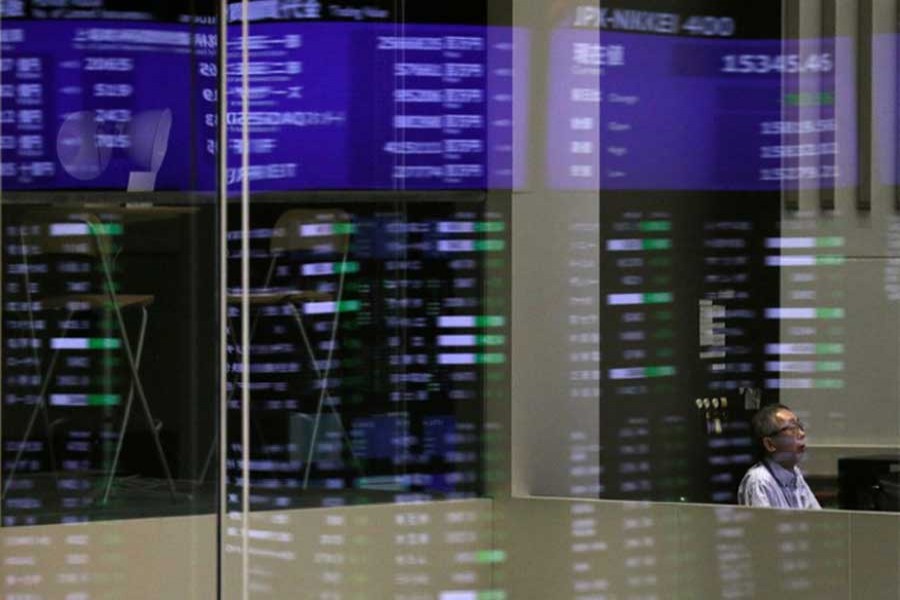A sell-off in Chinese shares pulled Asian equities to a 14-month trough on Monday as investors braced for a potentially damaging escalation in the Sino-US tariff row after US President Donald Trump raised the stakes in the dispute with Beijing.
MSCI’s broadest index of Asia-Pacific shares outside Japan skidded 0.9 per cent to the lowest since July 2017, extending losses from last week when it dropped 3.5 per cent for its worst weekly showing since mid-March.
In Europe, however, spread betters are pointing to a slightly more positive start with the focus on Sweden’s election results with the country headed for a hung parliament.
Futures for Eurostoxx 50, Germany’s Dax and London’s FTSE were modestly higher while E-Minis for the S&P 500 were a bit stronger too.
Asian investors were jittery after Trump said on Friday he was ready to slap tariffs on virtually all Chinese imports into the United States, threatening duties on another $267 billion of goods in addition to the $200 billion already facing the risk of duties.
Beijing has warned of retaliation if Washington launches any new measures, but it is running out of room to match them dollar-for-dollar, raising concerns it could resort to other measures such as weakening the yuan or taking action against US companies in China.
Chinese shares were battered with the blue-chip index off 1.4 per cent while Shanghai’s SSE Composite stumbled 1.2 per cent. Hong Kong’s Hang Seng index slipped 1.3 per cent.
Japan’s Nikkei, which had opened lower, ended 0.3 per cent higher after revised second-quarter gross domestic product data showed the world’s third-biggest economy grew at its fastest pace since 2016.
Trump, who is challenging China, Mexico, Canada and the European Union on trade issues, has now expressed displeasure about his country’s large trade deficit with Japan.
EM Risks
Investors are also on the edge about any contagion risks from turmoil in some emerging markets (EM) including Argentina and Turkey whose currencies have been routed recently.
Some Asian economies too are vulnerable, Nomura analysts said in a lengthy report with many countries burdened with high private debt. They also noted a “concentration risk” from some of the world’s largest funds’ heavy investments in EM assets.
The Indian rupee hit a record low of 72.50 per dollar while Indonesia’s rupiah - the region’s second worst performer this year - weakened 0.4 per cent, hovering near an all time trough.
“Given the latest comments from Trump, investors are likely to see the potential for further depreciation in EM currencies with the trade war cranking up yet another notch,” said Nick Twidale, Sydney-based analyst at Rakuten Securities Australia.
“Many EMs have broken ranges to trade at historically weak levels and investors will continue to monitor the sector closely with contagion fears still a major concern.”
Another factor weighing on global markets is the prospect of faster rate rises by the Federal Reserve after data on Friday showed US job growth accelerated in August and wages notched their largest annual increase in more than nine years.
The Fed is all but certain to raise rates a third time this year in late September.
The strong employment report boosted the dollar, which held onto Friday’s gains at 95.43. The index is up 3.5 per cent so far this year.
Investors will next focus on US inflation for August due Thursday and a stronger number could once again send the dollar surging.
The Australian dollar, a proxy for emerging market growth, hovered near its lowest in 2-1/2 years. The currency fell 1.3 per cent on Friday and was last at $0.7115.
The euro held at $1.15495 after two straight sessions of losses while the yen traded in a narrow range, changing hands at 110.9, Reuters reported.
In commodities, oil prices were firmer after three straight days of losses, with US crude futures up 44 cents at $68.20 per barrel. Brent crude futures added 52 cents to $77.35 a barrel.
Spot gold was a tad softer at $1,193.01.


